- Home
- Donald Hamilton
Night Walker Page 3
Night Walker Read online
Page 3
“All right, Dr. Henshaw.”
Then a girl’s face moved into Young’s field of vision, as the car started up beneath them.
“I reckon you must feel like you were being kidnaped, Mr. Young,” the girl said, smiling.
It took him a while to realize that she had addressed him by his rightful name.
Chapter Three
He awoke gradually to the sound of a phone ringing somewhere in the house to which he had been brought. They had given him something when they put him to bed here and it had not quite worn off yet; he lay drowsily with his eyes closed, unready to move, but listening. Somebody came out of a room not far away and went downstairs to answer. The door to his room was apparently open; he could hear the quick, light footsteps receding down the stairs — the sound dulled by a carpet — and then the girl’s voice speaking with the soft Georgia accent he remembered. He could not make out what she was saying to the person who had called.
The window of his room was also open. He could feel the breeze from it against the minor portions of his face not covered by bandages; and he could hear the sound of the occasional cars on the highway some distance away, and the faint field and woods noises that came quite clearly into the room although he knew himself to be on the second floor of the house. There was the buzz of an outboard motor on a body of water not too far away. My wife... is staying at our place over on the Bay, Lawrence Wilson had said. He had also said, We haven’t been getting along lately.
Mrs. Wilson came back upstairs, entered Young’s room, went past the foot of the bed to the window, and raised the Venetian blind. He opened his eyes.
“That isn’t too bright, is it?”
He had the remote feeling of looking at someone on a distant stage; it took him a moment to realize that the girl was addressing a question to him.
“No,” he whispered, “no, it’s fine.”
He watched from behind the shelter of the bandages as she came to the foot of the bed to look at him. He saw a slender, quite graceful, dark-haired girl apparently somewhat younger than his own age of twenty-nine. This morning she was wearing a long gold satin negligee that gave her a regal air; the effect was faintly marred, however, by the fact that her face was shiny and that her dark hair — somewhat longer than they usually wore it these days — was loose and a little untidy about her shoulders. It was clear that the telephone had awakened her, too. The lack of lipstick gave her face an unsophisticated and defenseless look.
“I declare, you haven’t been lying here awake for hours?” she said quickly. “There’s a bell right beside you, if you need anything, hear?”
There were at least two people in the house beside himself, he decided; she, in the room with him, and somebody below, apparently in the kitchen. The dark-haired girl, clearly feeling his attention wandering, tried again.
“How do you feel this morning, Mr. Young?”
“Swell,” Young said mechanically. “I feel fine.”
“Bob — Dr. Henshaw says you can eat anything you like. Shall I have Beverly fix you some breakfast?” She laughed quickly. “I forget you don’t know us. Beverly’s the cook. Dr. Henshaw — well, you met him yesterday. He’s the family doctor. I’m Elizabeth Wilson. We’re all real respectable folks, and this is our” — she hesitated, and tried a smile that did not succeed — “our first kidnaping.”
He was watching her hands, long and slender, gripping each other tightly as she faced him. The indirect sunlight from the window glinted on the rings — one displaying an impressive diamond — that would have reminded him, had he forgotten, who she was: the wife of a man who had tried to kill him; a girl who, knowing him not to be her husband, had nevertheless smuggled him out of the hospital and brought him here; a girl who knew his name. There was only one person from whom she could have learned it.
“Where is he?” Young whispered.
She glanced at him, startled. “Where is—?”
“Your husband.”
She was suddenly quite still; and for a moment he thought he saw in her eyes something gray and hopeless and lost, but the look vanished — if it had ever existed — and she laughed. “But how you do talk, Larry!” she murmured. “A person might think we weren’t legally married, listening to you.” She smiled at him, awaiting his protest, her slender hands still gripping each other tightly.
“But—”
“Honey, you’re not going to give me a lot of trouble?” she said softly, rather breathlessly. “I’d hate to think we weren’t going to get along... I’ll get your breakfast now.”
She turned away. He watched her go out of the room; even in a hurry she had a nice way of walking. The satiny whisper of her golden robe seemed to remain for a while after she had gone.
Young shook his head minutely at some thought that was not quite clear. He listened to make sure she was safely downstairs. Then he sat up in bed. This was a cinch. There was nothing to it; it just hurt like hell in his chest and several other places. When he had caught his breath from the pain, he looked at himself in the mirror over the dresser.
The complete anonymity of the image that confronted him was disconcerting. He told himself dryly, All you need now is a sheet and a length of chain to clank and you’re in the business. There was something ghostly and unnerving about the blank mask of bandages where a face should have been. Even with the eyes and the mouth showing, you could not help a dreadful little suspicion that there might not be anybody inside the stuff at all.
Young grimaced at his image in the mirror, which, except for a faint stirring behind the bandages, did not respond. He looked about the room, which had the look of a room in a very old house that had been quite well kept up for a while, but which had lately, for lack of money or interest on the part of the owner or tenant, been let go a little.
The wallpaper, still firm and fairly clean elsewhere, was blistered and discolored beneath the window where somebody’s neglect had let rain get to it; the white calcimined ceiling was stained in one corner from a roof or plumbing leak above; the old, brown-painted wooden floor was worn to the bare boards by the bed and near the door.
It was clearly a man’s room. The walls were hung with framed pictures of sailing yachts. A draftsman’s table in the corner held the preliminary sketches of a small cruising boat. The paper had a limp, flat look that indicated that a long time had passed since it had been pinned there. Wilson had been driving down from New York, on his way to Washington, Young remembered; he had given the impression of a man who did not spend much time at home these days.
A naval architect by profession, he had apparently made a hobby of designing sailboats in his spare time. It seemed like much too pleasant an occupation for a man who had done his cold-blooded best to murder a complete stranger. You wanted to think of the man who had tried to kill you as a perverted maniac, so that you could hate him properly; you did not like to think of him with a fine, if rather shabby, old house, and a beautiful, if rather enigmatic, young wife, and a room full of sailboat pictures that you wouldn’t have minded owning yourself in the days before you got your fill of the sea and everything connected with it....
He had heard the car approaching without paying too much attention, vaguely expecting, if he had thought about it at all, that it would pass along the road above the house without stopping, as others had done. Then it was coming down the driveway fast, around the corner of the house, and pulling to an abrupt halt in the gravel, almost directly, it seemed, below the window of his room. As he started to push himself across the bed to look, the driver jumped out and up the steps to the front door with the unmistakable sound of high heels clicking against bricks or cement. He heard Elizabeth Wilson, downstairs, go to the door; and heard the sound of her voice raised in quick protest; then two people crossed the downstairs hall and mounted the stairs rapidly, almost running. There was a little scuffle in the corridor outside his room, as he slipped quickly back beneath the covers.
“Please!” Elizabeth Wilson’s voice protested
breathlessly. “I’m telling you, honey, he isn’t awake yet!”
Another voice cried, “Well, it’s about time he woke up then! What the hell’s he got, sleeping sickness? Damn it, I tried to see him at the hospital and he was always too sick. And every time I call here you tell me he’s asleep. Asleep, my foot! What kind of a show are you putting on around here, anyway, Lizzy? You didn’t want any part of him when he was well; what’s this loving-wife routine, anyway? Who’re you trying to impress by making like Florence Nightingale? If Larry’s well enough to come home, he’s well enough to see me—” The voice, shrill and excited and quite young, ceased abruptly as the speaker entered the room. “Oh!”
Some instinct that he could not have explained made Young act out the part Elizabeth Wilson had prescribed for him. He opened his eyes now, and stared blankly at the ceiling for a moment; then, with the clumsy movements of a man awakening from deep slumber, he turned and raised himself a little to look questioningly in the direction from which the disturbance had come.
The small girl in the doorway was staring at his bandaged head with an expression of shock, temporarily silenced. Her face was quite familiar; it was the sharp young face from the snapshot in Lawrence Wilson’s wallet. The photograph had not warned him that the girl would have red hair: it was cut quite short about her head. She was wearing a crisp green linen dress, immaculate white shoes and gloves that gave her a dressed-up, little-girl look. Young studied her, vaguely perturbed; she was not quite the person Lawrence Wilson and his snapshot had prepared him for. Somehow the situation, if not the picture, had led him to expect a woman. This was just a spoiled and willful kid, with the fair freckled skin that went with that coloring, and a thin, reckless mouth bright with orange lipstick.
Young glanced from her to the taller, dark-haired girl behind her. Elizabeth Wilson was watching him also, he realized, and with a desperate intensity that shocked him. Still in her satin robe, she had not yet found time to put on make-up; and the pallor of her lips emphasized the terrible whiteness of her face. She was looking at him, he saw, without hope, despairing; her slender hands were locked together in the prayerful little gesture he had already come to recognize as a signal of distress. There was unconscious pleading in every line of her body as she faced him; yet it was clear that she had no thought of influencing him now. Whatever she might have thought to accomplish in her own behalf by bringing him here, it was too late now; and she was simply waiting for his first words to bring down upon her the unknown disaster she could no longer hope to avoid.
The silence ran on. Elizabeth Wilson moved slightly; she put a hand against the door jamb to steady herself. He saw the sickness of fear in her eyes. Although he did not know the cause of it, it was a sickness with which he was only too familiar; it made the two of them suddenly akin, a different breed from the small, assured, redheaded girl between them. He looked at the visitor, and licked his lips, and heard himself speak.
“Hi, Bunny,” he whispered.
Elizabeth Wilson drew a slow, gentle, unbelieving breath. The younger girl did not speak at once. When she did, her voice was a little too loud; it was clear that she was still disconcerted by the bandages.
“Hi, Larry,” she said, and, still too loudly and brightly: “What the hell have you been doing to your head?”
He found himself imitating, in a sick man’s whisper, what he could recall of Wilson’s hearty manner of speaking. “Why, I was feeling kind of low, so I gave myself a couple of licks across the dome. Some guy told me it was supposed to make you feel good when you stopped. He was a damn liar.” After a moment, he went on: “Thanks for the flowers, Bunny.”
“It’s all right,” she said. There was a little uncertainty in her manner now, as if she found the situation developing in an unexpected manner. “Are you — all right, Larry?”
“Hell, yes,” he whispered. “A broken nose, concussion, twenty-five stitches in my scalp, a couple of broken ribs... nothing to worry about, kid, nothing to worry about. Give me five years and I’ll be as good as new.” He chuckled. “Sure, I’m fine, Bunny. Everything’s swell.”
The girl flushed a little. “Well,” she said, “well, pardon me for making a damn fool of myself, people.” Her voice was shrill. “I just thought — Well, if everything’s so damn swell, I’ll just be running along!”
She looked from one to the other of them defiantly, as if daring them to laugh; then she whirled and was gone, and they heard the clatter of her heels, muffled, on the carpeted stairs. The front door slammed too loudly; and the car started up and went too fast up the drive, and along the road out of hearing.
In the room she had left, it was a long time before anyone moved. Then Elizabeth Wilson pushed herself away from the door jamb and walked stiffly across the room to the window. A full minute passed before she spoke.
“Why did you do it?” she asked then, softly.
“I don’t know,” he said.
“I’m grateful,” she breathed. “Of course I’m very grateful. But I don’t understand.”
She did not look at him. Her eyes were focused on something outside, far away. Presently he raised himself in the bed to regard the view at which she was staring with such fixity. It was a pleasant view. Below the window, the lawn sloped away from the house to the crest of a steep, wooded hillside, that in turn plunged down to the shore, where he could just see, through the trees, a dock at which a good-sized power cruiser was moored. Beyond was the mouth of a river, opening into a body of water that, from its size, could be nothing but an arm of Chesapeake Bay. A cruising sailboat of moderate size with a dinghy in tow was just heading out of the river, close-hauled to the brisk southeasterly breeze; and a small powerboat with the low, narrow lines of the oysterman of this region was coming in, making good time with the wind astern.
The sunlight glinted on the sharp little waves out there. Young saw spray break, quick and white, against the sailboat’s bow as she drove into the chop; the deck was gleaming wet forward and some stuff would be finding its way aft to the cockpit; everything would be secure below and the skipper would be laying out the expected day’s run on the chart. It would be time for another cup of coffee, or perhaps the first beer of the day... It was the first time he had looked at salt water for seven years, he realized. It gave him a queer feeling of nostalgia for which he was not prepared.
Preoccupied with these thoughts, he was hardly aware of the girl turning away from the window; then she was on her knees beside him, burying her face in the coverlet of the bed, her shoulders shaking beneath the bright satin of her dressing-gown.
“Oh, I can’t!” she gasped. “I can’t!”
“What is it?” he asked stupidly. “What’s the matter?” She did not answer; and suddenly a few of the pieces fell together in his mind as he looked down at her tousled dark head, and he asked the question he had asked once before: “Where is he? Where’s your husband, Mrs. Wilson?”
She lifted her wet face to him, kneeling there. Her voice was suddenly clear and almost steady. “He’s... out there,” she breathed. “Out there. Under the water. I killed him.”
Chapter Four
“It was late at night when he came,” she said quietly. “I’d been in bed for hours, trying to get to sleep. I don’t reckon I’ve had a good night’s sleep since Larry went away last year. Even if we didn’t... It’s such a big barn of a house to be alone in.”
Her voice trailed away. She was sitting on the edge of the bed quite close to him now. She stared straight ahead of her, unseeing; then she buried her face quickly in her hands.
“I declare, I’ve made such a mess of — of everything!” she gasped. “Everybody who has anything to do with me — nothing but trouble... Larry, and Bob Henshaw, and now you... If I had a scrap of decency, I’d shoot myself!”
Young came back to reality abruptly. She had had him fully with her, as an actress might have, a convinced and sympathetic audience; but this was phony tragedy. This was just a pretty woman wrapping up a situ
ation in trappings of remorse and self-abasement that she did not feel but thought would go over well. It caused him to look at her critically as she sat there in an attitude of despair, her head bowed, her tumbled dark hair spilling over the hands that concealed her face.
He found himself suddenly noticing certain disillusioning details of her appearance that he had missed earlier, or discounted, because you always gave a beautiful woman the breaks, wanting her to be perfect. It shocked him a little to realize, now, that Elizabeth Wilson missed perfection by a significant margin, even when you made allowances for her emotional state and the early hour of the morning.
It was not just a matter of hair and make-up. The gold satin housecoat had made a fine impression on a man just awakening from drugged slumber; but at close range you could not help noticing that the regal garment had been worn at least once too often since its last trip to the cleaners.
There was even a small, but noticeable gap in the seam behind the left shoulder, once clumsily mended but opening again; and the bright cloth of the sash was dull and threadbare where it knotted at the waist. Also, Young noticed, the nail polish on the slender hands was badly chipped... He stopped the inventory, suddenly ashamed, aware again of the odd sense of kinship that he had felt upon seeing the fear-sickness in her eyes.
For some reason, he remembered himself, a few days ago, shaky and bleary and with cuts on his face where the razor had slipped, struggling grimly to pull himself together into a reasonable imitation of an officer of the United States Navy. Somehow the two situations seemed comparable to him, although he could not have said why this was so.
Elizabeth Wilson stirred, her face still hidden from him. “I’ve made such a mess of my life!” she whispered through the shielding hands. “I’ve just ruined practically everything I ever touched!”
It seemed to Young suddenly that he knew this slender, graceful, somewhat untidy, dark-haired girl very well, which was strange, not just because he had only met her yesterday — for practical purposes, only this morning — but also because he had not known any girl very well for several years.

 The Two-Shoot Gun
The Two-Shoot Gun Mad River
Mad River Texas Fever
Texas Fever Ambush at Blanco Canyon
Ambush at Blanco Canyon The Big Country
The Big Country The Wrecking Crew
The Wrecking Crew The Devastators mh-9
The Devastators mh-9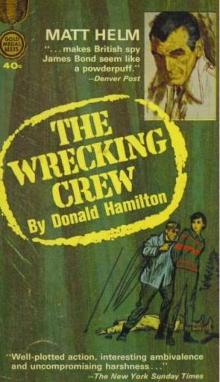 The Wrecking Crew mh-2
The Wrecking Crew mh-2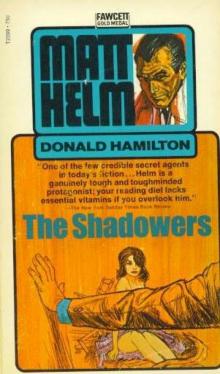 The Shadowers mh-7
The Shadowers mh-7 The Ambushers mh-6
The Ambushers mh-6 The Betrayers
The Betrayers The Terrorizers
The Terrorizers The Poisoners
The Poisoners The Devastators
The Devastators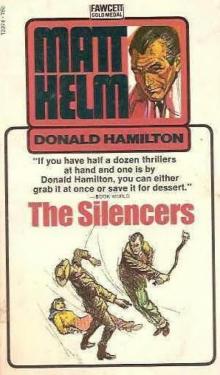 The Silencers mh-5
The Silencers mh-5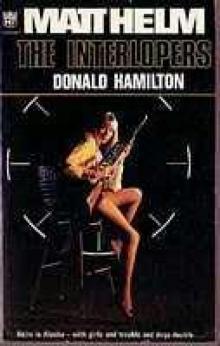 The Interlopers mh-12
The Interlopers mh-12 The Shadowers
The Shadowers The Annihilators
The Annihilators The Vanishers
The Vanishers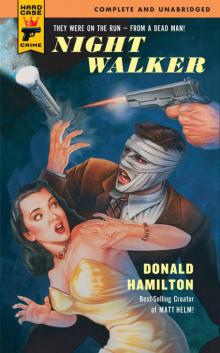 Night Walker
Night Walker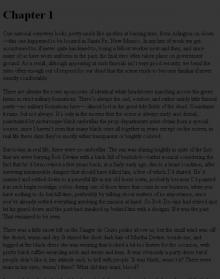 The Revengers
The Revengers The Frighteners
The Frighteners The Infiltrators
The Infiltrators The Intriguers mh-14
The Intriguers mh-14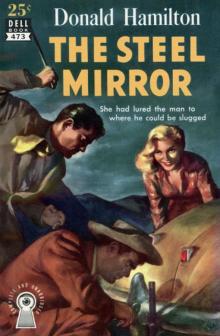 The Steel Mirror
The Steel Mirror The Menacers
The Menacers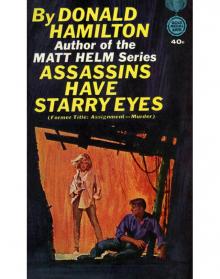 Assassins Have Starry Eyes
Assassins Have Starry Eyes Death of a Citizen
Death of a Citizen Matt Helm--The Interlopers
Matt Helm--The Interlopers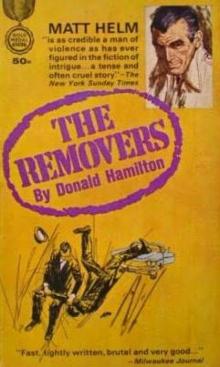 The Removers mh-3
The Removers mh-3 The Demolishers
The Demolishers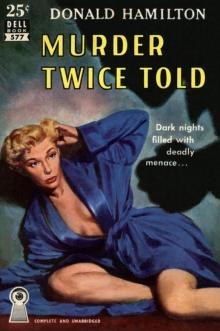 Murder Twice Told
Murder Twice Told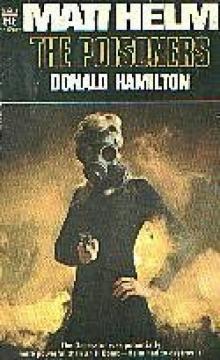 The Poisoners mh-13
The Poisoners mh-13 The Ambushers
The Ambushers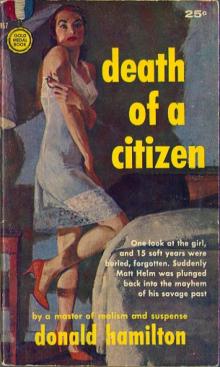 Death of a Citizen mh-1
Death of a Citizen mh-1 The Silencers
The Silencers The Removers
The Removers The Intimidators
The Intimidators The Damagers
The Damagers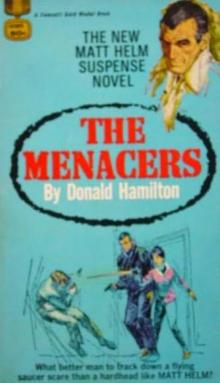 The Menacers mh-11
The Menacers mh-11 The Retaliators
The Retaliators Murderers' Row
Murderers' Row The Ravagers
The Ravagers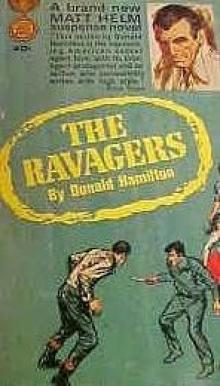 The Ravagers mh-8
The Ravagers mh-8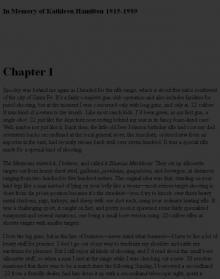 The Threateners
The Threateners The Betrayers mh-10
The Betrayers mh-10